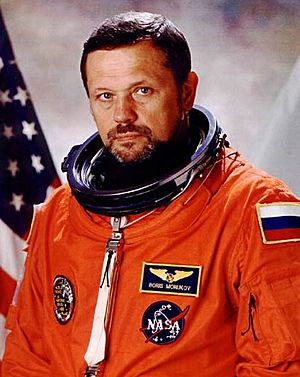Boris Morukov facts for kids
Quick facts for kids
Boris Vladimirovich Morukov
|
|
|---|---|
 |
|
| Born | October 1, 1950 |
| Died | 1 January 2015 (aged 64) |
| Nationality | Russian |
| Occupation | Physician, cosmonaut |
| Space career | |
| RKA Cosmonaut | |
|
Time in space
|
11d 19h 12m |
| Selection | 1989 |
| Missions | STS-106 |
|
Mission insignia
|
|
Boris Vladimirovich Morukov (Russian: Бори́с Влади́мирович Моруков) was a Russian doctor and cosmonaut. He was born on October 1, 1950, and passed away on January 1, 2015. He worked at the Institute for Biomedical Problems (IBMP). Boris Morukov trained with the Russian Federal Space Agency. He flew into space on the NASA Space Shuttle mission STS-106 as a special crew member.
About Boris Morukov
Boris Morukov finished high school in 1967. He then earned his medical degree from the 2nd Moscow Medical Institute in 1973. In 1978, he started working at the Institute for Biomedical Problems. There, he focused on medicine related to space, aviation, and naval travel. He also earned a Ph.D. in these areas in 1979.
As a doctor who was also a cosmonaut, Morukov had special medical training. Between 1989 and 1991, he learned about heart health, stomach issues, ear, nose, and throat care, and eye care. He also learned how to perform CPR. In 1995, he took an advanced course in emergency medical care. He also studied hormones and blood in 1996.
From 1990 to 1992, Boris Morukov took a basic space training course. For over 20 years, he helped provide medical support for space flights with people on board. He helped with long space missions on the "Salyut 6" space station from 1979 to 1980.
From 1982 to 1987, Morukov led science projects. These projects aimed to find ways to stop bad changes in the body. These changes can happen when people are not moving much (like in bed rest) or in microgravity (weightlessness). He was very interested in how to keep bones strong in space. He set up experiments where people lay with their heads tilted down for a long time. One experiment lasted 370 days. This helped test ways to keep astronauts healthy on long space trips.
He also worked on joint American-Russian medical experiments. These included missions like STS-60 and Mir 18/STS-71. From 1995 to 1998, he helped coordinate science experiments for the NASA-Mir program. He wrote over 100 science papers and had four inventions patented.
Space Travel Experience
Boris Morukov was first chosen to be a medical-cosmonaut in 1976. Because of his skills, he was continuously considered for this role. In 1989, he was officially selected as a cosmonaut-researcher. After finishing his basic cosmonaut training in 1992, he became a cosmonaut-researcher. He worked at the Institute for Biomedical Problems.
From January to July 1993, Morukov trained to be a cosmonaut-doctor for the Mir Space Station. He learned about the station's systems and how to perform medical tasks. From 1997 to 1998, he took more training for the International Space Station (ISS). He also attended a flight-surgeon training course in the United States from 1998 to 1999.
Morukov flew into space on the STS-106 mission. This mission took place from September 8 to 20, 2000. The crew of STS-106 successfully got the International Space Station ready. They prepared it for the first group of astronauts who would live there. The five astronauts and two cosmonauts delivered over 6,600 pounds of supplies. They installed batteries, power converters, a toilet, and a treadmill. Two crew members also went on a spacewalk. They connected power, data, and communication cables to the new Zvezda Service Module. Boris Morukov spent 11 days, 19 hours, and 10 minutes in space.
His Passing
Boris Morukov passed away on January 1, 2015, at the age of 64. The cause of his death was not shared publicly. He is survived by his wife, Nina, his son Ivan, his daughter Olga, and his mother, Lidia F. Khromova.
See also
 In Spanish: Borís Morukov para niños
In Spanish: Borís Morukov para niños
 | Jackie Robinson |
 | Jack Johnson |
 | Althea Gibson |
 | Arthur Ashe |
 | Muhammad Ali |

